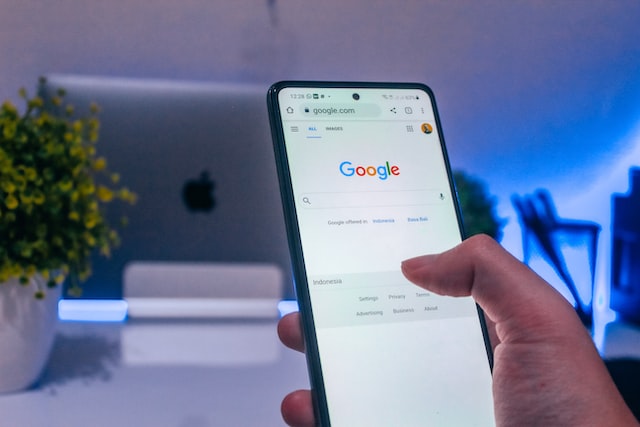Advance Your Business Goals with Google Search Ads

Although Google doesn’t share its search volume data, it’s clear that the search engine has a massive reach. When people have any sort of question, turning to Google is the quick and easy solution. It has been estimated that Google processes 63,000 search queries every second. This is equal to approximately two trillion searches per year. So, by learning how to best harness the power of this search engine through optimization efforts, you can really build brand awareness and earn more conversions.
But the fact of the matter is, SEO takes time. If you want to get quicker results, then you should consider investing in Google Ads. Let’s see what Google Search Ads, specifically, can do for your business.
Why is Google Search so important?
Google continues to be the most powerful search engine by far. It has even gotten to the point where we use “google” as a verb. Many of us conduct Google searches every day. This knowledge matters for your business because neglecting to follow best SEO practices will make you miss out on sales. Today’s customers expect you to have a high-quality, high-ranking website. Doing so will help those customers trust you more and, thus, be more likely to buy from you. But Google’s search algorithms are constantly changing. In order to generate traffic to your site, you need to provide targeted, relevant information. Google Search Ads can achieve that.
How are Google Search Ads displayed?
The point of Google Search Ads is to capture the attention of users when they ask a particular query. Within that query search, these ads can appear either above or below the organic search results. This includes searches done in the Shopping tab, Google Images, Google Maps, and Google Play. The positioning of your ad will depend on the ranking, which is determined by Google’s preferences and how much you spend. With a countless number of other businesses trying to earn a spot for their ads, you must ensure that yours are convincing. Use an expertly curated list of keywords to construct your title, description, and display URL.
What do ad extensions do for my business?
When you create an ad, you are given the option to provide extra information about your business. This could be your telephone number, location details, or additional links. The goal behind these ad extensions is to increase engagement and influence ad quality. Users want to have all of the relevant information about your business in one easy-to-access place. After all, they are on a mission to solve a problem. So, by including various ad extensions in your Google Search Ads, you are able to provide users with a better experience while encouraging them to take action. You will obtain more qualified leads this way.

Photo by Malte Helmhold on Unsplash
How do I set up a Google Search Ads campaign?
Before all else, you have to make a Google Ads account. Once logged in, you can start setting up your new campaign. Select “Search” for the campaign type. From there, you will be able to figure out all things having to do with money. Google Ads allows you to determine your daily budget. You are also provided with recommendations for bidding strategies so that you can optimize your ad spend. Next, select your targeting options to reach the right audience. Refine that audience even more with keyword-specific ad groups. Create the content for your Google Search Ads, including any ad extension configurations. And then send it out into the world wide web!
What are Dynamic Search Ads?
It can feel time-consuming to create an ad for each page of your website. This is why Google came up with Dynamic Search Ads. These can help you increase the reach of your Search campaign. You only have to do three things—pick the pages, set your daily budget, and choose an ad template. Google will then decide how to customize and target your ads. To do this, Dynamic Search Ads uses the index of your website to automatically create headlines and destination URLs. These will be entirely catered to the customer’s search term. The benefits of Dynamic Search Ads are that they are incredibly time-saving, match with searches you may have missed, and still allow you to have control.
How can I control who sees my Google Search Ads?
Google aims to help the right people see the right content. In order to have the most control over which searches prompt your ads, you need to think like your customer. What keywords are they typically searching for? This is information that will aid you in your SEO campaign, as well, since it will show you what may drive people to your site. Keyword targeting is critical for determining what kind of language you should be using on Google Search Ads and web pages. Note that these keywords should be based on your business goals, too. If you need a guiding hand, Google can dynamically create text ads and keyword lists based on your website content.
What do I need to do to improve my Quality Score?
The quality of your ads, keywords, and landing pages is displayed in your Quality Score. There are three main parts of your Google Search Ads that factor into this score.
- Expected click-through rate: This is also known as the likelihood that your ad will be clicked. To improve this rate, experiment with different calls to action and be as specific as possible.
- Ad relevance: Your Google Search Ads need to match the intent behind a user’s search. Use relevant languages and locations in your content.
- Landing page experience: You need to be sending traffic to the right pages. Each of these pages should load quickly, come across as trustworthy, and have consistent content with your ad.

Photo by Surface on Unsplash
How does the Google Ads auction work?
Not every single ad is going to get a top space on Google’s search engine results pages. This is due to Google Ads being based on auctions. These auctions have a dynamic nature. The bidding algorithms tailor bids to each user’s unique context. Google Ads auctions start after a person performs a search, leading to Google calculating the Ad Rank for all of the possible ads. It will decide which ads are eligible to be shown. Along with establishing the position of an ad, the auction system determines what the cost per click (CPC) is. Be aware, though, that CPC can vary a lot between auctions because it depends on a variety of contextual factors.
What is Google Ads Smart Bidding?
The visibility of your Google Search Ads is largely controlled by bidding during the auctions. It can be a challenge to take into account every signal influencing user behavior. For instance, you would need to consider location, time, and device. With that in mind, Google came up with Smart Bidding to provide an automated solution. It uses machine learning to optimize for conversions. Automated bidding takes the guesswork out of setting bids, which ultimately allows you to more efficiently reach your performance goals. This means that you can drive higher conversion value or volume than you would with manual bidding.
Why are responsive Google Search Ads so effective?
Through the help of responsive search ads, your business can show the most relevant messages to your audience. It helps to have several headlines and descriptions ready to go. A single responsive search ad can have up to 15 headlines and four descriptions. Your business benefits from having multiple ad combinations because Google Ads has a better opportunity to test ad variations in accordance with users’ search terms. You are then able to compete in more auctions. Over time, Google Ads will learn which combinations are the most relevant to your customers.
Something you should understand is that paid ads don’t handle everything for you. You should also take time for SEO efforts. These are tweaks that you make to your site in order to give it more leverage on Google. Essentially, you’re making it more accessible for both human visitors and crawlers. Consider letting a Texas SEO company like WEBii take this off of your plate. Feel free to contact us to discuss what your site is in need of.
Posted in: SEM, Small Business, WWW Learning Center
Comments are closed.
Latest & Greatest
- Beyond Pretty Pictures: Why Solid Web Design Matters (More Than You May Think)
- Getting Creative with Your 404 Not Found Page Design
- Web Design Solutions: Which Option Is Right For You?
- Maximize Your Site Redesign Budget: What Texas Web Developers Need From You for a Cost-Effective Collaboration
- Responsive Web Design in Austin: Why It Matters For Your Local Business
- How to Prepare Your Website for a PR Campaign
- Why Defining Your Organization’s Strategy is Key to Brand and Marketing Development
